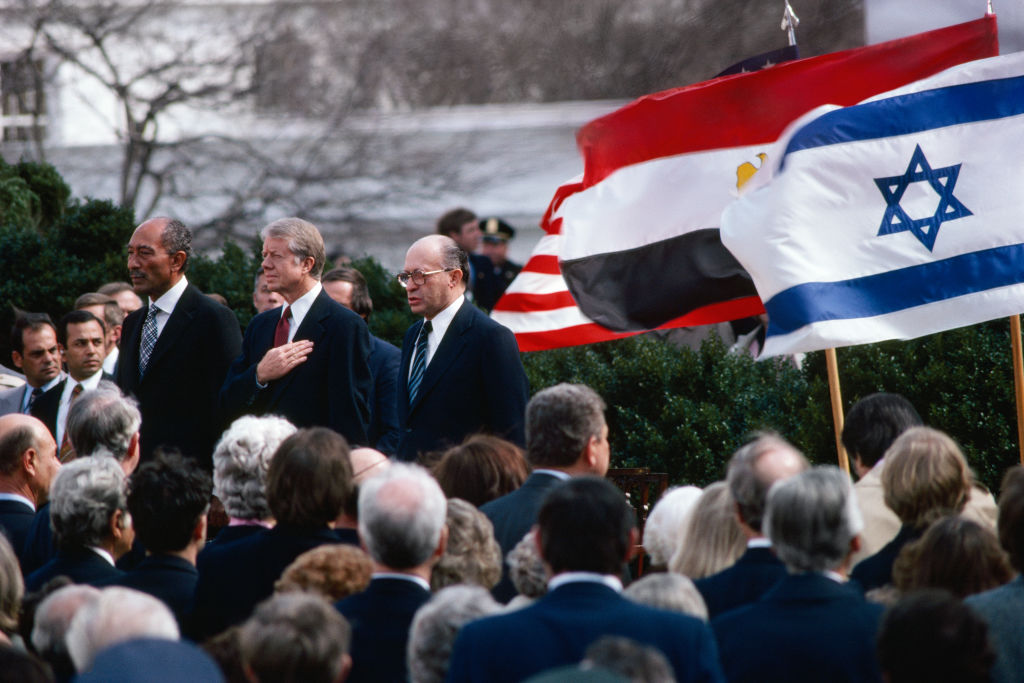
The Biden Administration is confronting a world that looks a lot like the 1970s.
Israel has been surprised by an attack on a Jewish holy day, Russia is bogged down in a war with a neighbor, superpower competition is on the rise, American embassies are under attack in the Middle East, and the U.S. appears unprepared to deal with the threats of an ever-changing world.
Yet, while similarities between the 1970s and the 2020s abound, these aren’t just parallel moments. Rather, the failures by the American government in handling the crises of the 1970s helped lay the groundwork for the events in 2023—especially in the Middle East. And recent administrations have compounded the situation by failing to grasp the mistakes of the past and correct course.
In the 1970s, American policymakers strove to create security and stability in the region. But these efforts floundered because they did not do enough to address the plight of hundreds of thousands of Palestinian refugees—or to bring about a peaceful resolution of the Palestinian-Israeli conflict.
When Jimmy Carter entered office in 1977, he had an ambitious plan to pursue a comprehensive Arab-Israeli peace process that would guarantee Palestinian statehood and rights.
Over the next three years, however, the process fell apart. The initial blow came four months after Carter was sworn in. For the first time, Israeli voters handed control of the Knesset to a right-wing government led by new Prime Minster Menachim Begin. Begin took a hard line in terms of the peace process, and his refusal to make concessions made securing any regional deal difficult.
Further plaguing Carter's efforts throughout 1977, the Arab states were completely divided over how to represent themselves at a peace conference. They split over questions of what a self-governing Palestinian entity—or, prior to that, even a Palestinian delegation—might look like. Indeed, the Palestine Liberation Organization (PLO), recognized by the Arab states as “the sole legitimate representative of the Palestinian people,” refused to recognize Israel’s right to exist (though they had previously signaled willingness to do so). On another front, Syrian President Hafez al-Assad insisted on the return of the Golan Heights, which the Israelis had captured in the 1967 War, along with an agreeable solution for the Palestinian people.
Read More: Former Israeli Prime Minister: Israel’s Endgame in Gaza Should be a Palestinian State
Those were just a few examples of the hurdles that made it impossible even to bring all of the parties together to negotiate—let alone brokering a deal.
Additionally, in October of that year, the U.S. reneged on an agreement to host a comprehensive Middle East peace conference with the Soviet Union, due to a mix of domestic political pressure and advocacy by Israel. Because the Arab states had better relations with the Kremlin than with the White House, this drastically lowered the odds of the Arabs coming to the table. While Carter subsequently attempted to revive the comprehensive peace process, he never came closer to it than he did in his first year in office.
As Carter's hopes for a comprehensive Middle East peace deal crumbled, it left only the bilateral peace process between Egypt and Israel, which in 1978 culminated in the Camp David Accords and later the Egyptian-Israeli Peace Treaty.
Crucially, however, while Carter's painstaking effort produced a historic peace deal between Begin and Egyptian President Anwar Sadat, the exclusion of the Palestinians from the negotiations created tremendous headaches for his administration. This, combined with Begin’s support for increased settlement expansion in the West Bank and other areas that at the time included Gaza, the Sinai Peninsula, and the Golan Heights, ensured that the Arab countries collectively opposed the agreement, which made it far harder to expand the peace process.
Furthermore, while the treaty clearly stipulated that Egypt, Israel, and the U.S. had to work out a deal on the creation of a Palestinian “self-governing authority” in the West Bank and Gaza Strip by May 25, 1980, the Israelis had no intention of doing so. This largely stemmed from Begin’s belief that “a Palestinian state would be a mortal danger to Israel. It would inevitably be a PLO state . . . turning in no time to a Soviet base.” Begin's intransigence, combined with Carter’s reluctance to force the Israelis to make concessions, ultimately made it impossible to solve the question of Palestinian statehood—which affected America’s Cold War effort as well.
Carter was hoping to develop a “consultative security framework” with the “moderate” Arab states (Jordan, Saudi Arabia, and Egypt) to protect American interests in the region from the Soviets and their “radical” Arab friends like Syria, Libya, the Palestine Liberation Organization (PLO), and South Yemen. Especially after the 1979 Iranian Revolution, Carter was also concerned with securing America’s oil supply.
The moderate Arab states—particularly Saudi Arabia and Egypt—were actually terrified of being overrun by the Soviets and the “radical” Arabs. But the Saudis and Jordanians were also concerned about how their respective publics might react if they increased their security ties with the U.S. or joined the peace process without the creation of a Palestinian state.
Carter’s team understood that if the U.S. was to increase the security of the Persian Gulf, “the military aspect is only half the equation . . . the other half is the need to strengthen and accelerate the peace process.” As National Security Advisor Zbigniew Brzezinski argued, “All of our actions on the security side are futile unless there is parallel progress on the Camp David accords.” Failure to conclude a peace deal that included the Palestinians, Carter’s advisors recognized, risked alienating potential Arab allies and opened up the region to increased Soviet influence.
This conundrum led William Odom, Brzezinski’s military assistant, to advise that the administration “should separate our Arab-Israeli policy from our strategy for the Persian Gulf.”
But that proved impossible. And Carter was unwilling to force the issue with the Israelis, largely because of domestic political constraints, but also because Sadat had given up so much in negotiations that Egypt had no leverage left, rendering their attempts to pressure the Israelis moot.
Without a Palestinian state and an acceptable settlement to the Israeli-Palestinian conflict, Carter could not establish a pro-American consultative security framework in the Middle East.
Today’s regional security situation is plagued by similar challenges.
Read More: How the Yom Kippur War Changed Israel
As was the case with Begin in 1980, over the decades, numerous Israeli governments have proved unwilling to make substantial concessions to the Palestinians—even when Arab states made it clear that they would not normalize relations without respect for Palestinian sovereignty and rights. Yet, once the Arab states demonstrated increased willingness to make peace without serious concessions, Israel had even less incentive to address Palestinian sovereignty.
The last few years have featured eerie similarities to the dynamic first seen in the Carter years. During Donald Trump’s presidency, the U.S. followed Israeli Prime Minister Benjamin Netanyahu’s lead in normalizing relations between Israel and other Arab states before any Israeli-Palestinian deal. The Israelis liked this idea because it reduced support for the Palestinian Authority from potential wealthy allies, thereby decreasing the PA’s leverage in negotiations. Both Netanyahu and Americans policymakers also saw normalization of relations between Arab states and Israel as a key way to balance against Iran.

The Trump Administration’s orchestration of the Abraham Accords between Israel and the United Arab Emirates, Bahrain, Sudan, and Morocco, and the Biden Administration’s attempt to expand the Accords to include Saudi Arabia, left Palestinians with little leverage. As was the case with Begin, Netanyahu’s government took advantage of this situation to enable a massive expansion in Israeli settler activity in the West Bank.
More from TIME
The terrorist attack on Oct. 7 upended the situation. Hamas’ attack was horrific in its brutality and its intentional targeting of civilians. Yet, it seems to have at least temporarily achieved one of its aims: preventing an impending Saudi-Israeli peace agreement. The attack and ensuing war have worsened relations between Israel and its Arab neighbors—in large part due to the Arab public’s support of the Palestinian people.
That underscores the lesson that the Trump and Biden Administrations should have learned from the late 1970s: without a lasting settlement acceptable to the Palestinian people and respect for their human rights, regional security is a pipe dream.
Benjamin V. Allison is a PhD student in history at the University of Texas at Austin, where he specializes in U.S. foreign and national security policy since 1945, especially toward the Middle East and Russia. He also studies terrorism. Made by History takes readers beyond the headlines with articles written and edited by professional historians. Learn more about Made by History at TIME here.
More Must-Reads from TIME
- Cybersecurity Experts Are Sounding the Alarm on DOGE
- Meet the 2025 Women of the Year
- The Harsh Truth About Disability Inclusion
- Why Do More Young Adults Have Cancer?
- Colman Domingo Leads With Radical Love
- How to Get Better at Doing Things Alone
- Michelle Zauner Stares Down the Darkness
Write to Benjamin V. Allison / Made by History at madebyhistory@time.com
